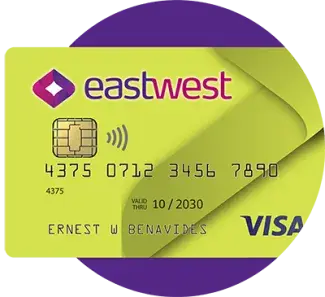A bit of vigilance and some new habits on your part can go a long way to making your banking and shopping experience better and secure. Remember these:
Personal Identification Number (PIN)
- Choose a PIN that other people will not easily guess. Avoid using your birthday or combinations like 123456, 101010 etc.
- Keep your PIN a secret. Memorize it. Don’t write it down, especially on your card.
- Change your PIN from time to time.
- Never disclose your PIN to anyone. No one should ask for your PIN, including representatives from EastWest.
Password
- Create a strong password with at least 8 characters composed of alphabetic (uppercase and lowercase), numeric, and special characters.
- Don't use information that could be easily linked to you, like your nickname, your favorite band, or your favorite movie.
- Change your password from time to time.
- Have a different password for each website account, your computer, and your wireless network.
- Like your PIN, keep your password a secret.
- Do not share your password on the phone, in texts or by email. Legitimate companies will not send you messages asking for your password. If you get such a message, it is probably a scam.
Physical cards
- Keep all your cards in a safe place and do not let anyone else use them.
- Protect your cards. They probably will not work if they get demagnetized, scratched or bent.
Control and monitoring
- Set the purchase and withdrawal limits of your Debit and Prepaid cards. Setting these limits gives you greater control over your spending and reduces the risk of fraud.
- Review your account statements carefully for unfamiliar transactions. Or better yet, sign up for EastWest Online to get secure online access to your account anytime, anywhere.
- When no longer needed, safely dispose of your statements, receipts and documents that contain information relating to your financial affairs by shredding them.
Computer / mobile device
- Always keep your computer security up to date with anti-virus and anti-spyware software, and a good firewall.
- Set your operating system and web browser to update automatically.
- Copy important files onto a removable disc or an external hard drive and store it in a safe place. If your computer gets compromised, you'll still have access to your files.
Network
- Avoid using a public Wi-Fi connection. Most Wi-Fi hotspots do not encrypt the information you send over the internet and are not secure.
- Secure your home wireless network. Change the default name of your router and protect it with a strong password. Turn off “remote management” features, if any.
- Turn on the encryption feature of your wireless router. Using encryption is the most effective way to secure your network from intruders.
- Encrypt your network with WPA2, which offers better protection compared to the older alternatives Wired Equivalent Privacy (WEP) and Wi-Fi Protected Access (WPA).






